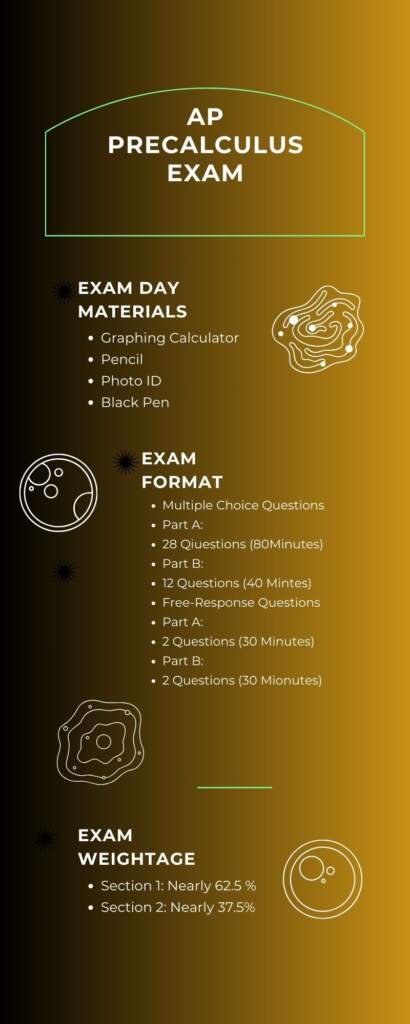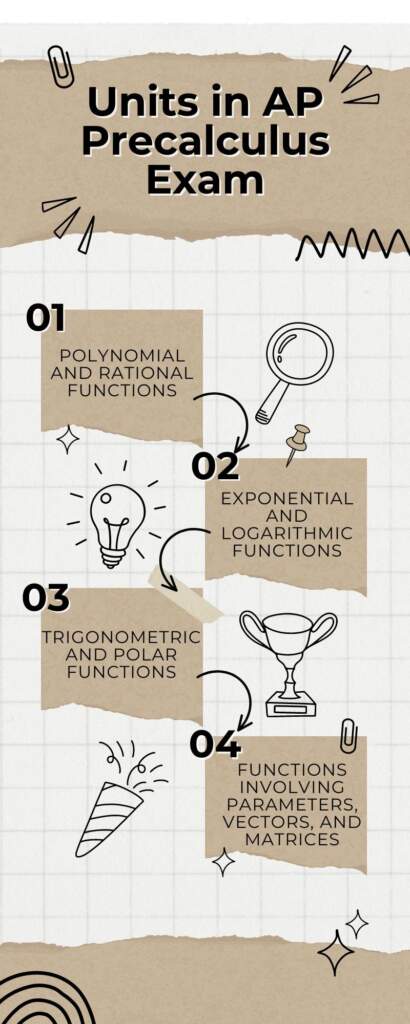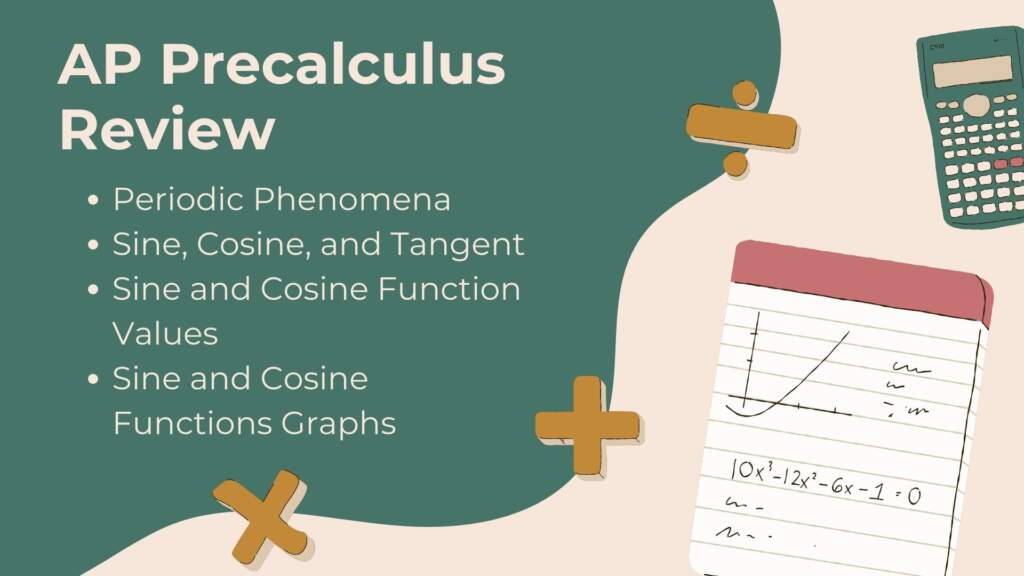AP Precalculus is an advanced mathematics course that prepares you for critical calculus and other mathematics courses. This course covers various topics, such as trigonometry, matrices, functions and their graphs, analytic geometry, limits and continuity, exponential and logarithmic functions, and sequences and series.
The course emphasizes honing your comprehension of mathematical concepts and deepening problem-solving skills. Major attention is given to graphic functions, determining their behavior, and solving critical equations. Trigonometry is a prime component in analyzing functions and their applications.

AP Precalculus encourages mathematical reasoning, critical thinking, and the association between different mathematical concepts. The course frequently incorporates technology and practical applications to enhance learning and is relatively difficult than Precalculus. Successfully completing AP Precalculus prepares you for more advanced courses, majoring in STEM (Science, Technology, Engineering, and Mathematics) fields and DigSAT Math.
If you are an SAT aspirant as well, you might find How to get a perfect in SAT Math helpful.
The Curriculum of the AP Precalculus
AP Precalculus is a diligent course that typically covers the key concepts, processes, and theories that shape trigonometric functions, the behavior of functions, and other fundamental mathematical concepts. You will do hands-on projects and activities to explore mathematical phenomena. This course will act as a ground work for everything covered in AP Calculus AB. Below are the units covered in this course;
| Unit | Description | Weightage |
| Unit 1: Polynomial and Rational Functions | – In this unit, you engage with critical polynomial equations, identify the intricacies of rational functions, and master factoring techniques.
-The graphing processes are emphasized, facilitating a critical comprehension of the graphical representation of the functions. -Analyzing the end behavior of polynomial and rational functions -Determining domain and assumptions of function models |
30% to 40% |
| Unit 2: Exponential and Logarithmic Functions | -This unit emphasizes the geometric sequences and exponential functions critically
You have to grasp the principles of growth and decay and apply these principles to real-world scenarios, including population trends, radioactive decay, and compound interest. -This unit forms a critical bridge between algebraic principles and their practical applications. |
27% to 40% |
| Unit 3: Trigonometric and Polar Functions | -This unit is an ultimate journey into the trigonometry world. From the basic concepts of trigonometry to mastering cosine, tangent, and sine functions.
-Modeling scenarios and data with sinusoidal functions -Graphing functions with polar coordinates -Illustrating how radii and angles change relative to each other in a polar graph |
30% to 35% |
| Unit 4: Functions Involving Parameters, Vectors, and Matrices | -This unit presents the versatility of functions with parameters, which permit you to conduct functions concerning changing parameters.
– Use vectors to analyze the motion of an object – Modeling change through matrices – Illustrating the influence of a transformation matrix on a graphical object |
Not Evaluated in the AP Exam |
Mathematical Practices
| Practice | Description | Exam Weightage |
| Procedural and Symbolic Fluency | Algebraically manipulate functions, expressions, and equations | 39% to 48% |
| Multiple Representations | Translate mathematical data between representations | 20% to 27% |
| Communication & Reasoning | Communicate with precise language, and provide critical rationale for conclusions | 32% to 39% |

Overall Structure of the AP Precalculus Exam
The AP Precalculus Exam is divided into two major sections: MCQs (Multiple-Choice Questions) and Free-response. The MCQ section comprises 40 questions (worth nearly 63% of the overall score), while the free-response section comprises 4 questions (worth approximately 37% of the total number).
The MCQs are designed to evaluate your comprehension of the fundamental concepts of precalculus. Whereas the free-response questions are quite challenging and require you to apply your knowledge and skills to solve critical problems.
The exam format of the AP Precalculus includes;
| Part | Number of Questions | Duration for Each Part | Total Weightage |
| Multiple -Choice Questions | |||
| Section A (Non-calculator Portion) | 28 Questions | 80 Minutes or 1 hour 20 minutes | 44% |
| Section B (Graphing Calculator required) | 12 Questions | 40 Minutes | 19% |
| Free Response Questions | |||
| Section A (Calculator may be required) | 2 Questions | 30 Minutes | 19% |
| Section B (Calculator is not required) | 2 Questions | 30 Minutes | 19% |
AP Precal tests four different types of FRQ. Here is an overview;
| Free-Response Task Model Overview |
| Free-Response Task Type |
| FRQ 1: Function Concepts. Here, is a link to a sample video with the solution; https://www.youtube.com/watch?v=4Ibnu8mRKmU |
| FRQ 2: Modeling a Non-Periodic Context. Here, is a link to a sample video with the solution; https://www.youtube.com/watch?v=baPVwVx6sx4 |
| FRQ 3: Modeling a Periodic Context. Here, is a link to a sample video with the solution; https://www.youtube.com/watch?v=aSvgPgN3vZQ |
| FRQ 4: Symbolic Manipulations. Here, is a link to a sample video with the solution; https://www.youtube.com/watch?v=utByxSGCAOg |
The Scoring System of the AP Precalculus
After the AP Precalculus exam, the raw scores for every part are converted into major scale scores which range from 1 to 5, as per the method that contemplates the complexity of the exam. The last step is to add the results to determine the final AP Precalculus exam score of the student.
- MCQs: You will get 1 point for every MCQ you answer correctly. It is important to note that there are no number deductions for wrong answers.
- Free-response Questions: Each free-response questions earn you 12.5 points.
- The Free-response and multiple-choice parts are each worth 50% of the score.
- Your score on free-response questions is scaled accordingly and added to your score on MCQs to get an AP Precalculus score. Later, this sum-up score is converted to a final score on the 1 to 5 AP scale.
The Major Concepts of the Course are:
- Multiple representations of functions
- Modeling with Functions
- Symbolic manipulation of algebraic equivalence and functions
- Functions illustrating a dynamic association between two major variables
Curious about reliable resources of AP Precalculus? Checkout Top 10 books for AP Precalculus
Who is Suitable to take AP Precalculus?
- Suitable for students who take Algebra 1 in their 8th or 9th grade.
- Suitable for students who have completed Integrated Math 3, Geometry & Algebra 2.
How to prepare for AP Precalculus?

Studying for the AP Precalculus Exam needs discipline, a basic structured approach, and dedication. Here are some important suggestions on how to effectively prepare for this exam;
- Practice Critical Problems: Daily practice critical problems are crucial for mastering the concepts of the subject and skills required for this exam. You are suggested to review materials provided by your textbook or teacher or further seek out extra resources online.
- Review the Course Materials: Before starting the preparation for the exam, ensure to review the course material properly. Review the lecture notes and textbook chapters.
- Join Study Groups: Study groups can offer scope to work through critically challenging material with teachers or classmates. Work on critical problems, review materials, and discuss concepts with other students for better clarity.
- Prepare Flashcards: Flashcards are an effective way to memorize key equations, terminology, and concepts. Therefore, it is recommended to prepare a set of flashcards with the most important information and review them often.
- Search for Additional Resources: Several online resources are available to assist you in preparing for the AP Calculus exam.
- Take More Practice Exams: Practice exams can help you familiarize yourself with the structure and format of the AP Calculus Test. Revise exam questions from previous years to better understand the question format, or you can practice question sets from online resources.
- Take Private Tutions: Different online platforms such as Tutoring Maphy offer full-study courses to prepare you for the AP Calculus exam. This platform has professional AP Calculus teachers who can assist you with coursework practices, clarification of concepts, and test preparation to help you get standard grades on the exam.
- Note: For further information, please visit the Tutoring Maphy website. It is important for you to remember that effective studying requires consistent effort over time. Hence, you should start preparing early and stay positive and focused.
Summary
In summary, AP Precalculus is a good scope for those seeking to improve their mathematical abilities and prepare for a more successful academic journey. This course also helps in taking the journey further to almost everything covered in AP Calculus BC. We offer you a brief overview of the AP Precalculus Exam and provide you with the required knowledge to get the desired outcomes in this exam. We analyzed the important prerequisites for this course, identified the complexities of its curriculum, and also presented the exam format. This AP Precalculus overview is specially tailored to equip you with the understanding and confidence required to master this course.
FAQs:
- Is AP Precalculus hard?
AP Precalculus is quite a challenging yet rewarding course at the same time that needs consistent practice and dedication, accordingly. Typically, it builds upon your already existing knowledge and prepares you for more critical and advanced mathematics topics, including calculus. Furthermore, whether AP Precalculus is hard for you is based on certain factors, such as your actual study habits, how at ease you are with abstract concepts and your background in mathematics.
Furthermore, the course builds upon the major concepts learned in trigonometry and algebra, so you need to have an appropriate foundation in those subjects. This course certainly covers a lot of concepts in a very short time, thereby you are suggested to learn efficiently and quickly.
Interested to know about the hardest AP exams? Check out this two part blog: A guide to the most difficult AP Exams Part 1 and Part 2
- Is AP Precalculus the same as calculus?
Calculus and AP Precalculus are typically both math courses that are mainly taken during high school. Although, there are slight differences between these courses, such as;
Calculus is a more advanced type of course that majorly covers the concepts of integration and differentiation. Here, integration is the procedure of finding the area under a curve, whereas differentiation is the process of finding the rate of functional change. Calculus majorly is used in different fields including engineering, economics, and physics.
On the other hand, AP Precalculus is an imperative for Calculus. It typically covers the important mathematical concepts that are required for Calculus, including analytic geometry, functions, and trigonometry. It also presents some of the fundamental concepts of Calculus, such as derivatives and limits.
- Do colleges care about AP Precalculus?
Answering this question is quite challenging, as most colleges do not require AP Precalculus, as it is not a commonly provided AP Course. Although, colleges give importance to your math preparation and performance in more advanced math courses. While AP Calc is mainly regarded as the most important course offered in high schools, colleges also look at your preparation and performance in AP Precalc. If AP Precalculus is offered by your high school and you choose to take this, later colleges might take it as a positive attribution of your readiness for more advanced math courses.
- Can I skip pre-calc and go to AP Calc?
If you take AP Calculus AB or AP Calculus BC without preparing for Pre-calc as a basic course, you may struggle to get a B or C, and also, there is a high chance of doing poorly on the AP Calculus exam. Hence, skipping Pre Calc and going directly to AP Calc can be challenging, as Pre Calc offers needed basic skills and concepts that are essential for further success in AP Calculus.
Ultimately, it is important to make more informed decisions based on your own capabilities and the suggestions of teachers. Skipping Pre-calc and going for AP calculus directly without basic knowledge can be challenging for some students, though it is crucial to ensure that you grasp the basic concepts to succeed in advanced courses.
- Is AP Precalc worth taking?
Yes, it is definitely worth taking AP Precalc or AP Precalculus. Below are the major reasons why taking this exam can be worthwhile for you;
- College Accredit: Based on your exam score and the policies of the college you desire to attend, a relatively high score on the AP Precalc exam can earn you worthy college credit. This can help to save your money and time on high tuition costs, as you might be able to skip the basic precalculus courses in college. Especially, you can major in Computer Science, Physics, Mathematics, Engineering, or other STEM fields. If you are interested to know more about credits, checkout How are AP and College credits related?
- High Chances of Placement: Rather than only college credit, a relatively high score on the AP Precalculus test can also help you to earn high possibilities of placement in advanced-level Precalculus courses in college. This can further give you a fresh start and permit you to take advanced courses earlier.
- Fascinate in Precalculus: Importantly, taking the AP Precalculus test can be a critical way to accomplish your major interest in Precalculus and deepen your concepts of mathematics. By analyzing more advanced levels of precalculus concepts and practicing major problem-solving skills, you can actually gain an in-depth appreciation for the basic power of mathematics or calculation.
- Career Attributions: Taking the AP Precalc test and getting a relatively high score, presents colleges and future employers that you have mastered college-level Precalculus skills and concepts. This can be a positive impression on your resume or college application when you are trying to make your career as an Engineer, Mathematician, Data Scientist, or Computer Scientist.
Interested to know how many AP exams are conducted by College board? Check out The complete list of AP exams
Are you also planning to take Digital SAT? Read all about the New Digital SAT Format



